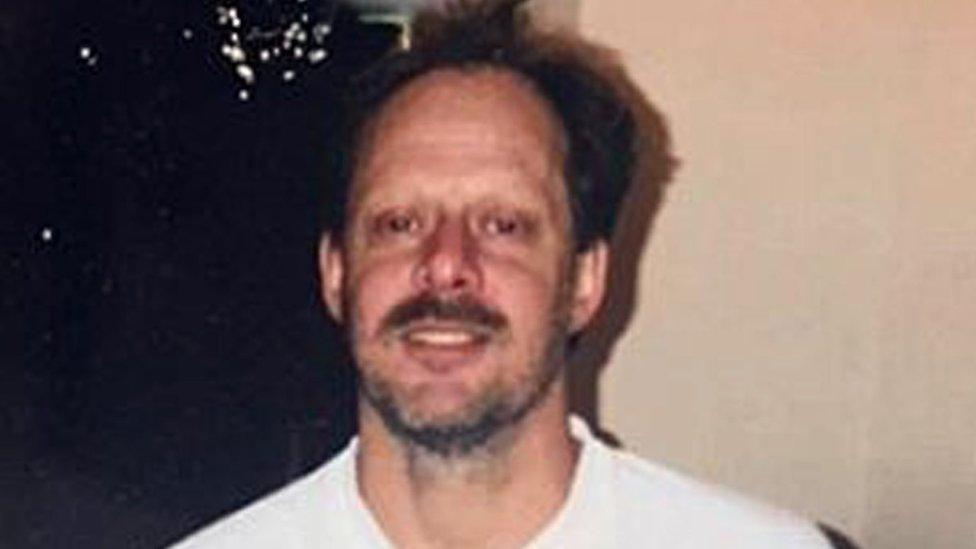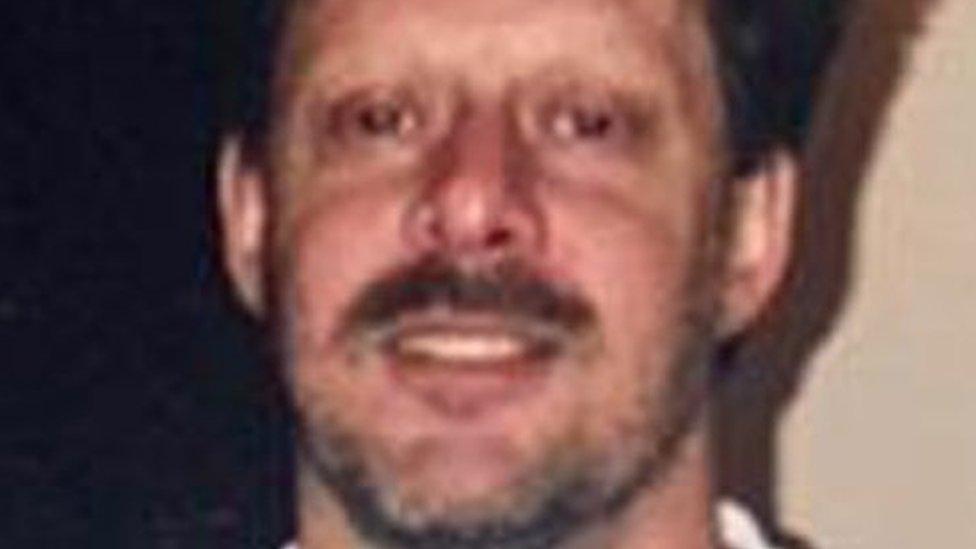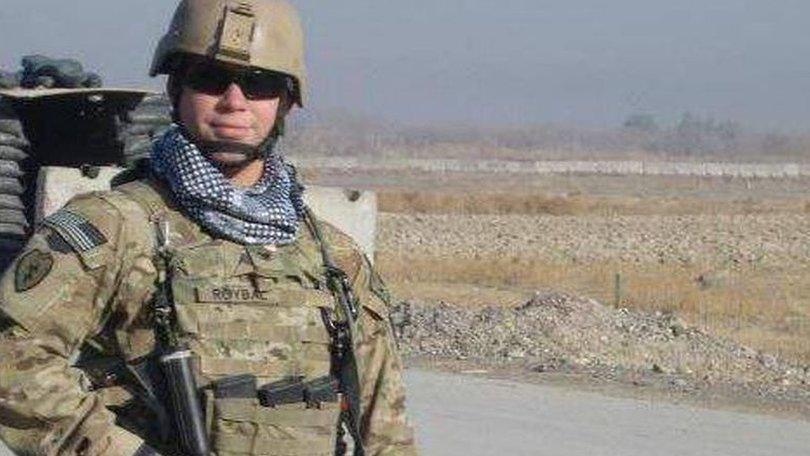Las Vegas shooting: What was Stephen Paddock's motive?
- Published

Paddock has been described as having "doted on" Ms Danley
"Everyone has three lives," Colombian author Gabriel Garcia Marquez once posited. "A public life, a private life and a secret life."
It remains unclear whether a secret life led Stephen Paddock, a 64-year-old wealthy, retired accountant with a penchant for gambling, to open fire on a Las Vegas music festival crowd and kill 58 people and injure 500 others before turning the gun on himself.
Police are continuing to search for clues on what would trigger him to commit the deadliest US shooting in recent history.
"My hunch is there is a secret life here that will eventually be uncovered," said J Reid Meloy, a forensic psychologist at the University of California at San Diego who researches mass shootings.
Though the suspect appeared to show no red flags about his intentions, Paddock had been quietly stockpiling 33 high-powered weapons - which included assault rifles and explosives - over the past 13 months. He spent decades acquiring guns and ammunition, police said.
Paddock's family and friends appeared puzzled by the attack, with his girlfriend, Marilou Danley, describing him as "a kind, caring, quiet man", while his brother, Eric Paddock, told reporters that he was stunned.
But Mr Meloy said there are several warning behaviours, external that signal whether an individual might be capable of committing such a crime.
Eric Paddock says he is in total shock after police named his brother, Stephen, as the shooter
One such behaviour pattern Paddock demonstrated is pathway, or engaging in research, planning and preparation for an act of violence.
At least 23 guns - 12 of which were equipped with bump-stocks, or rapid fire devices - were found inside Paddock's Mandalay Bay hotel room while he also set up cameras both inside and outside the suite.
Paddock also wired $100,000 (£75,400) to his girlfriend while she was in the Philippines and instructed her to buy a house with the cash, removing her from the final stages of his plan.
But Paddock did not appear to show other behavioural patterns typical of perpetrators, Mr Meloy said, including fixation on a person or issue, identification with a previous attacker or as a soldier for a particular cause, or acting out in novel aggression, testing his ability to become violent.
However, that may change as the investigation unfolds, he said.
'Why me?': Survivors of a senseless act face a different kind of trauma
The retiree's age also appears to stand out among previous active shooters, which typically range from 15-19 years old and the 35-44 age group, according to a New York Police Department Active Shooter report, external released last year.
Adam Lankford, a University of Alabama criminologist and researcher who tracks global mass shootings, said individuals who carry out such crimes tend to have suicidal motives or appear indifferent to life or death, perceive themselves as victims or seek attention and fame.

Paddock's girlfriend, Marilou Danley, described him as "a kind, caring, quiet man"
Mr Lankford warned that without explicit statements from Paddock about his reasons for the attack, determining a motive is mostly speculation.
But he pointed out Paddock filed a negligence lawsuit against the owner of The Cosmopolitan resort and casino in Las Vegas in 2012, alleging he "slipped and fell on an obstruction on the floor" that cost him $30,600 in medical expenses. The casino's owner disputed the claims and the lawsuit was dropped in 2014, court records show.
That could have been an incident of perceived victimisation, Mr Lankford suggested.
Another striking detail from Paddock's life is his father, who spent years on the FBI's 10 Most Wanted list as a bank robber and whose criminal career spanned five decades.
Though Paddock did not grow up with his father, the detail could shed light on the gunman's perception of fame, Mr Lankford said.
"His father became famous for committing crimes," Mr Lankford continued, "that's a dangerous lesson for a child."
Mr Meloy also questioned whether there might have been a heritability of psychopathy in Paddock, passed on from his father.
"I'm not saying he committed this mass murder because of the psychopathy of his father," Mr Meloy cautioned. "But imagine the degree of callousness, detachment and cruelty that it would take to open fire on that crowd.
"The motivation may be very much embedded in his personality."

Who is Stephen Paddock?
From 1976 to 1985 worked as a postman, an Internal Revenue Service agent and an auditor for the Defense Contract Audit Agency
Worked for the predecessor company of Lockheed Martin in the 80s
Maintained relations with his younger brother Eric but estranged from older brothers Bruce and Patrick
Grew up in Sun Valley, California, and attended California State University in Northridge
He was married twice and had no children
Sources: US media reports

Mental illness is another trait that often permeates the narrative of a mass shooting, but Jonathan Metzl, a Vanderbilt University professor who studies the history of mental illness, warned that linking it to gun violence is misguided.
While estimates vary, a 2015 analysis, external of perpetrators who killed or intended to kill four or more people found that 22% of male killers displayed evidence of mental illness.
Less than 5% of US gun-related killings between 2001 and 2010 were committed by people diagnosed with a mental illness, according to the National Center for Health Statistics.
And according to a 2016 database of mass shootings involving four or more victims, just 15% of mass shooting suspects had a psychotic disorder while 11% had paranoid schizophrenia, Northeastern University criminologist James Alan Fox found, external.
People who suffer mental illness are actually far more likely to be a victim of a violent crime rather than commit the act themselves, Mr Metzl said.
"Linking [mental illness] to mass shootings reinforces the stigma that people with mental illness are ticking time bombs," he said. "And in turn, it ignores the context of gun culture, gun access and other factors that play a part in a shooting."
Instead, Mr Metzl explained that the focus should be preventing an individual like Paddock from carrying out a mass shooting rather than retro-actively trying to predict who could.
However, Mr Meloy emphasised that while warning behaviours can help prevent acts of violence, they cannot predict them.
After the Las Vegas attack in October 2017 the BBC looked at how US mass shootings are getting worse
- Published5 October 2017

- Published5 October 2017

- Published21 March 2019